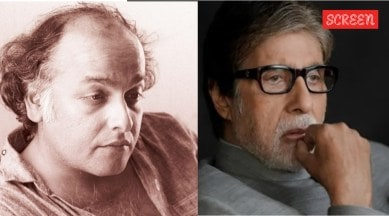Click here to follow Screen Digital on YouTube and stay updated with the latest from the world of cinema.

Filmmaker Mahesh Bhatt has occasionally hinted at differences between himself and actor Amitabh Bachchan. He has criticised Bachchan’s film Silsila in the past, claiming that it inspired him to make the more realistic Arth. But as it turns out, he once wrote an article in the 2000s, when he ostensibly accused Bachchan of having a God complex. At the time, a temple had been erected in Bachchan’s honour in Kolkata, leaving Bhatt perplexed at society’s urge to bow down before Gods. “Human beings love to revere someone larger then themselves. I wonder why?” he wrote.
Bhatt continued, “What would make people in the east of Kolkata erect a makeshift temple near Mall Road on Guru Purnima day and then in an air filled with the fragrance of burning incense pray for hours with passion and folded hands to a wax idol of Amitabh Bachchan? What would make them turn the superstar into a living God? All these questions rushed through my mind when this happened recently because although this news was received with jubilation by the Mumbai film industry, it made me sad.”
Bhatt said that he was disappointed about how deeply society had regressed into superstition despite the advancement in science. In the article, he wrote that Bachchan’s ego must’ve received a boost after the erection of the temple, and accused the actor of seeking validation.
He continued, “Most of them might not have realised that this personal God was actually an idol carved in the image of themselves, a projection of their own limited needs, fears and desires. And by praying to this God, the followers hoped to establish a permanent link with the cultural phenomenon of their time. In the case of Kolkata too, one can see that the members of Amitabh Bachchan’s fan club hope to get a sense of security for themselves and reinstate everything they stand for, by exalting him to the status of a God. Being a part of this belief system, this event must have inflated Amitabh’s ego to monstrous proportions. And because disciples often attribute magical powers to their Guru, experts feel that this form of idealization is even more dangerous than falling in love. Because this love is often one-sided. All gurus are megalomaniacs and narcissists. Their only aim in life is to be loved rather than love anyone else. This need to be loved and to be the center of attention, together with the grandiosity which accompanies It shadows them till they die. Amitabh’s ‘agreeing” to become a guru and a god is an expression of his need to be loved and validated. Of course this is not the first time this is happening. All the time new aspirants for the position of God are being born, waiting to displace the one that sits on the ‘throne’ before them.”
Bhatt ended his article by declaring that the ‘ultimate ambition of man’ is to be God, and to be ‘worshipped’ by all, and to have their life symbolize Friedrich Nietzsche’s question, ‘if there is a god why ant I not him?'”
In an earlier interview, Bhatt had criticised Yash Chopra’s film Silsila, which featured Bachchan, alongside Rekha and Jaya Bachchan. “My take was that you don’t have an extramarital affair and dance in tulip gardens. Its a secret relationship. People keep it a secret and the feeling is filled with guilt. I was so sure about it because I have experienced it myself. When you put a little bit of realness in your film, then audiences relate to it better and sense the truth,” he said in an interview with Radio Nasha.
Click here to follow Screen Digital on YouTube and stay updated with the latest from the world of cinema.